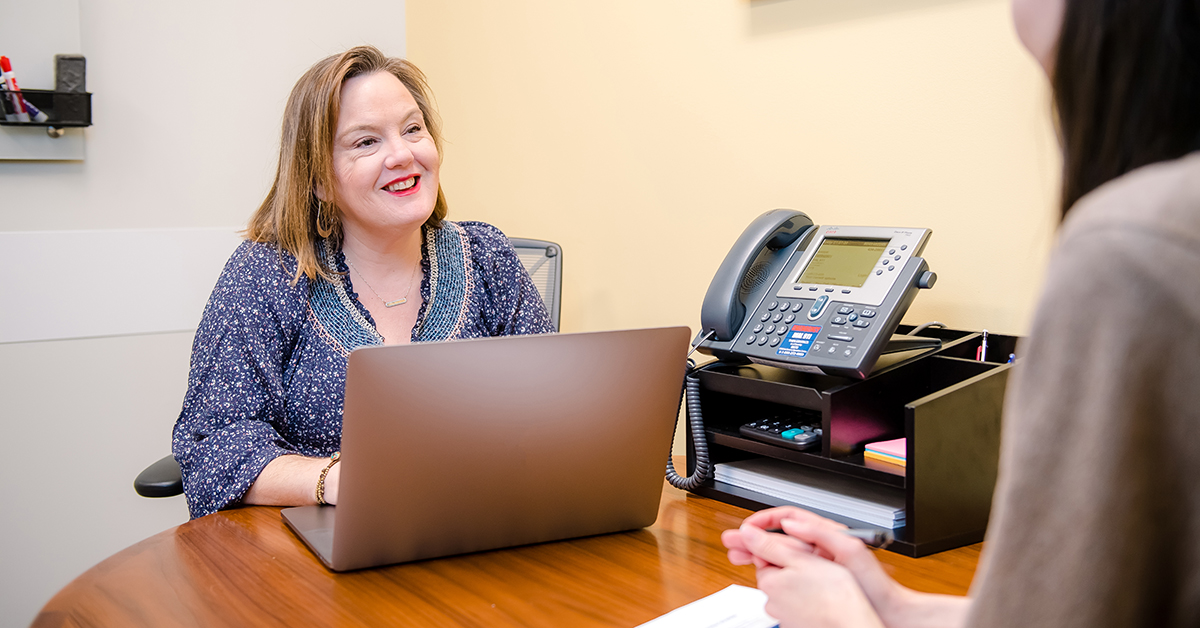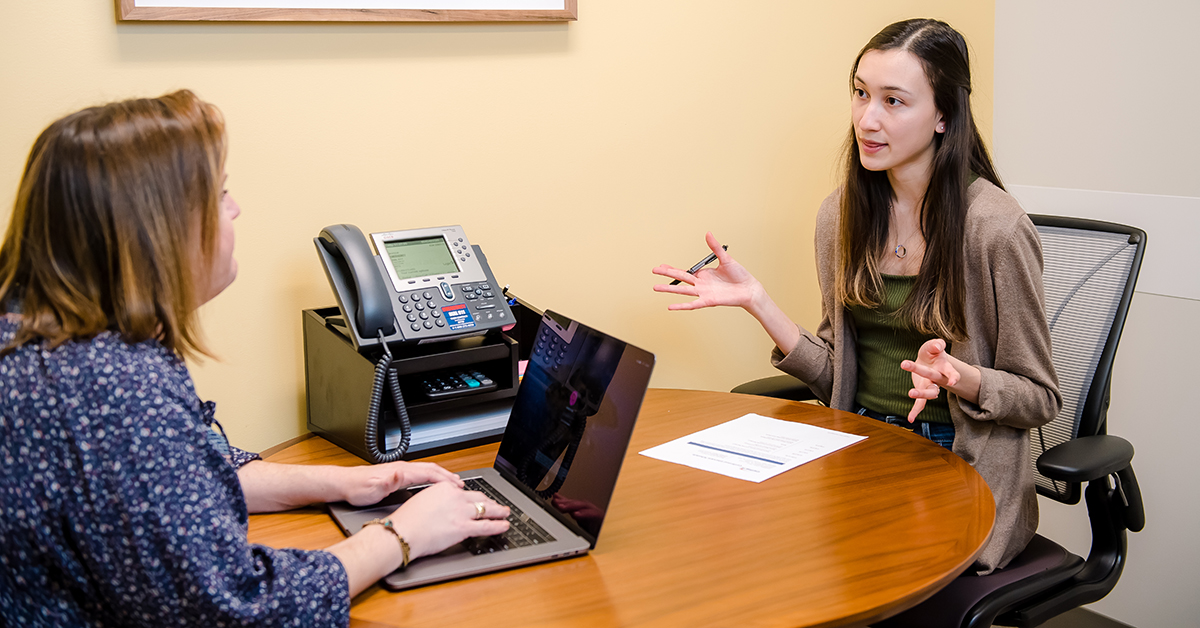Copyright ©2021 Capital One. Opinions are those of the individual author. Statements are deemed accurate at the time of posting. Unless otherwise noted, Capital One is not affiliated with, or endorsed by, any company mentioned. All trademarks and intellectual property used or displayed are the property of their respective owners.
7 Tips to Ace Your Case Interview
You’ve sent your application and had a great phone call with your recruiter. You’re probably pretty stoked at this point and ready for the next phase. That is, until your recruiter mentions these two words: Case Interview. At that point, confusion may have set in. You ponder, “What’s a case interview and how do I prepare?” Unless you have an MBA or prior consulting experience, you’re probably new to this type of interview. “How do I prep for a case interview? Is there a case interview framework I can use?” Take a deep breath. The case interview is simply a chance for you to showcase the unique business problem solving skills you can bring to a variety of consulting, analyst or leadership roles. Prepping for a case interview can feel intense, but with our 7 tips below, you’ll be prepared to tackle your case interview with confidence.

Why companies use case interviews
The case interview is a great way to introduce you to different situations you may face in your new role. Joe, a Distinguished Engineer and case interview designer, explains that case interviews help when “looking for people who are effective communicators with good problem solving skills and good analytical skills.” Beyond showcasing logical and analytical reasoning, cases offer a chance to highlight your conceptual problem-solving, clear and influential communication, creativity, flexibility and positive attitude. All of these are integral parts of success in these types of positions.
Share your thinking and make it conversational
A common misconception about case interviews is that it’s about getting to the “right” answer. “That’s often part of it, but it is most centrally about sharing your point of view and bringing us along for the journey,” shares James, a VP in Business Analysis. While there may be sections of the case where you need to arrive at a mathematically correct answer, interviewers are primarily interested in HOW you tackle the problems you face, as well as how you explain your thought process. The interviewer will be looking to understand your communication style, problem solving capabilities, and how you analyze the data.
Throughout your case interview, it’s best to maintain transparency and share your logic and strong reasoning for your decisions throughout the process. This is a great chance to show your command of concepts by breaking down complex technical terms into easier to understand language, and if you can easily explain technical concepts to someone not familiar with your field, it will help create shared understanding and establish your credibility.

Cases are interactive, but not collaborative
Case interviews are designed to be an open conversation between you and your interviewer. Take the lead and guide the discussion. “We want you to think like the business owner,” shares Nina, a Director in Campus Recruiting. Envision you’re a business owner with a business problem to solve.
Cases are guided assessments where your interviewer may prompt you or redirect you, but they cannot help you solve the problem itself. You can—and are encouraged to—ask your interviewer questions to gather more information and talk through your thought process as you weigh your options. Your case interviewer is able to help guide you through the case, but you must do the problem solving, calculations and identify solutions on your own. Ensure you set up your equations properly and can convert units of measurement if needed. Practicing these skills will show you’re well prepared for the interview and potential scenarios.
Though case interviews can be challenging, there is no hidden agenda. The primary goal of the case interview is to see you brainstorming and communicating at your best. “The goal is not to trick you; it’s to see how you think and solve problems,” Nina adds. “Because that’s what we want you to do here—jump in and solve problems!”
Let your experience speak for itself
Although it is an interview, the case interview is not intended to be a time to discuss your resume. Regardless of your prior experience with the subject of your case, focus on using the unique insights you have and applying them to the problem, rather than discussing your work experience at length.
Nina summarized the difference by saying, “Don’t use the case to highlight your resume, but do draw in your experience as a human.” You will have an opportunity to discuss previous work experience in other types of interviews—like our Behavioral or Job Fit interviews. You can still demonstrate skills from your previous experience through your practical work on the case. General life experience and common sense can be immensely helpful in case interviews as well.

Be prepared to defend your answer with data
Case interviews ultimately don’t have one right answer. You may need to make several correct calculations along the way, and you will ultimately make and defend a recommendation for how the business should proceed, given all of the information you have been given and have gathered. “You don’t have to look for a single answer,” Nina clarifies. “There are places for single answers, but if you’re thinking broadly about a case, there is going to be more than one final answer.” More than likely, you will be faced with a few different, reasonable options for how to proceed in the case. James describes, “You’re showing us what thinking through a problem looks like for you—how you weigh qualitative and quantitative pros and cons.” Though there are many possible answers, your case interviewer is primarily looking to see how you work through the problem, get to your solution and ultimately arrive at a final recommendation.
7 Tips To Prepare For Your Case Interview
- Share your thinking and reasoning while working through the case. Your interviewer will be just as interested in HOW you got to your final answers and recommendations as they will be with the answer itself and if it is correct.
- Get comfortable solving an issue from start to finish and offering a solution on your own. The case interviews are not collaborative and your interviewer can’t help you reach an answer.
- Avoid talking about your resume. You will have other opportunities to do this. Let your skills and experience speak for themselves in the way you solve the case problem.
- Remember, there isn’t always one right answer. Your case will require a series of calculations, and your answer should take the form of a recommendation addressing how a business owner should proceed, using evidence from your thought process and information gathered along the way.
- Practice case interviews and business cases online. Practice explaining your thinking as you move through a practice problem, including explaining the math you’re using along the way.
- Refine how you explain complex concepts in simple, easy to understand terms. Your interviewer will be looking for your ability to convey technical approaches in non-technical terms, as if you were explaining your solution to a member of a different field.
- Practice organizing information and recording and labeling data to convey your thoughts in an orderly, data-driven way. You’ll need to refer back to your data and calculations when you defend your solution, so it will help you to develop a good organization system to find them quickly and easily.
With these tips in mind, you will feel confident and stay positive in the midst of what can feel like a challenging interview. Remember, don’t stress—this is a great opportunity to showcase the unique perspective you have to offer in a new role.
Read similar stories
-

How to Prepare for a Virtual Case Interview
With the advent of social distancing due to the Coronavirus, norms around a lot of jobs, including the interview process, have transformed. We want to help you navigate the interview process and feel confident throughout your journey at Capital One—here are some tips on how to tackle a virtual case interview.
-

How to Add a Virtual Background to Your Zoom Meeting
Looking for some Zoom background inspiration? We’ve pulled together some of our associates' favorite spots across our Capital One campuses to set as custom backgrounds. Follow our step-by-step guide to set a custom Zoom background for your interview or your next team meeting!
-

7 Tips to Nail Your Virtual Interview
You did it. You got the call for the final round of interviews. And you’ve now been told that your interview will be virtual. While there are some obvious advantages, you may need some reassurance on the virtual interview experience. Here are 7 tips to nail your virtual interview!
Product Innovator Jobs
- Principal Associate, Data Scientist - US Card (Marketing) R236670
- Senior Associate, Data Scientist - US Card (Marketing) R236682
- Design Researcher - Principal Associate level R235241
- Director, Product Design - AI in Experience Design R236672
- Principal Associate, Data Scientist - LLM Customization Team R229942
- Content Designer, Product Design - Senior Associate level R232305
- Content Designer, Product Design - Principal Associate level R231502
- Senior Associate, Quantitative Analyst - Commercial Credit Modeling Team R236369
- Principal Quantitative Analyst - Model Risk Office R236371
- Principal Associate, Data Scientist - Small Business Charge Card Valuations R236379

